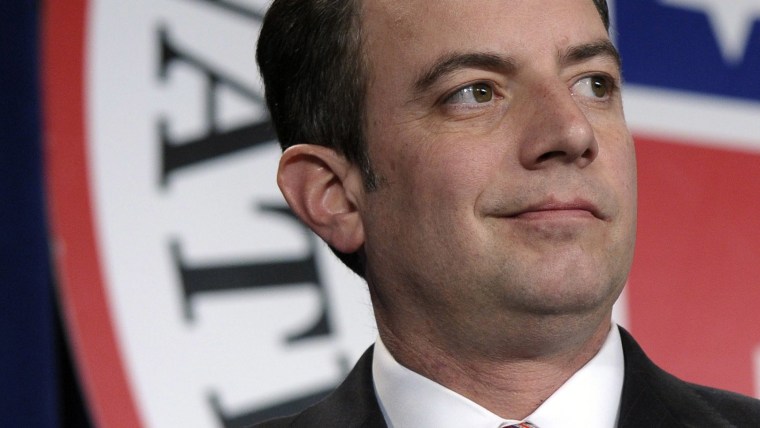The race for the 2012 Republican presidential nomination was many things, but it wasn't dull. A seemingly endless series of debates created an unfortunate dynamic in which GOP candidates pandered to extremists in a brazen -- at times even cringe-worthy -- way, while at the same time, creating televised soundbites that ended up being repeated well after the primaries were over.
Today, as Kasie Hunt reported, Priebus got his wish.
The Republican National Committee on Friday announced plans for nine presidential primary debates this summer and fall, with an additional three possible late in the primary season. It's a dramatic drop from the 22 debates that were held during the 2012 presidential primary season and represents an attempt to protect GOP candidates from potentially damaging remarks on the debate stage.
Priebus said in March that his goal was to keep the total below 10, and that's very likely to happen. The RNC today endorsed nine debates between August and February, with three more events that would be held if the race for the nomination is still unclear by the spring of 2016.
Also as expected, Republicans appeared eager to reward Fox: of the nine agreed upon debates, two will be held on Fox News, including the first in August, with a third scheduled for Fox Business in November. A fourth Fox debate will be held in March if necessary, while a separate, RNC-endorsed "Conservative Media Debate" is also still pending.
Republican officials set aside exactly zero debates for msnbc. NBC News will host one debate, an event in Florida next February, but it will be co-hosted by Telemundo. ABC and CBS each got one, while CNN will host two (with a possible third pending).
The moderators of the events have not yet been announced, but it's worth emphasizing that Priebus said he intends to reject debate moderators unless he considers them sufficiently "interested in the future of the Republican Party and our nominees."
In other words, partisan, softball questions are welcome and encouraged.
There is a certain irony to all of this. A long-forgotten portion of the RNC's 2012 "autopsy," party officials, following national defeats up and down the ballot, specifically argued, "The Republican Party needs to stop talking to itself. We have become expert in how to provide ideological reinforcement to like-minded people, but devastatingly we have lost the ability to be persuasive with, or welcoming to, those who do not agree with us on every issue."
Three years later, it appears Republican officials have moved in the exact opposite direction, choosing instead to reinforce the partisan bubble.
It seems like ancient history, but in the 2008 Democratic presidential primaries, candidates and party activists balked at Fox-hosted debates, concluding there was no point in having Republican partisans organize and moderate Democratic events. At the time, much of the Beltway establishment was outraged -- if Dems are afraid to debate on Fox, the argument went at the time, how can Americans trust them not to be afraid of al Qaeda?
That's actually not an exaggeration. In fact, I remember writing a post about this in 2007. Fox News' Roger Ailes specifically argued at the time, "The candidates that can't face Fox, can't face al Qaeda." Joan Vennochi wrote in the Boston Globe soon after, "If you can't face the bad boys of Fox News, how can you face the bad boys of Iraq or Iran?"
I'll be eager to see if Republicans face similar criticisms now. I have a hunch the pushback will be far less severe.
